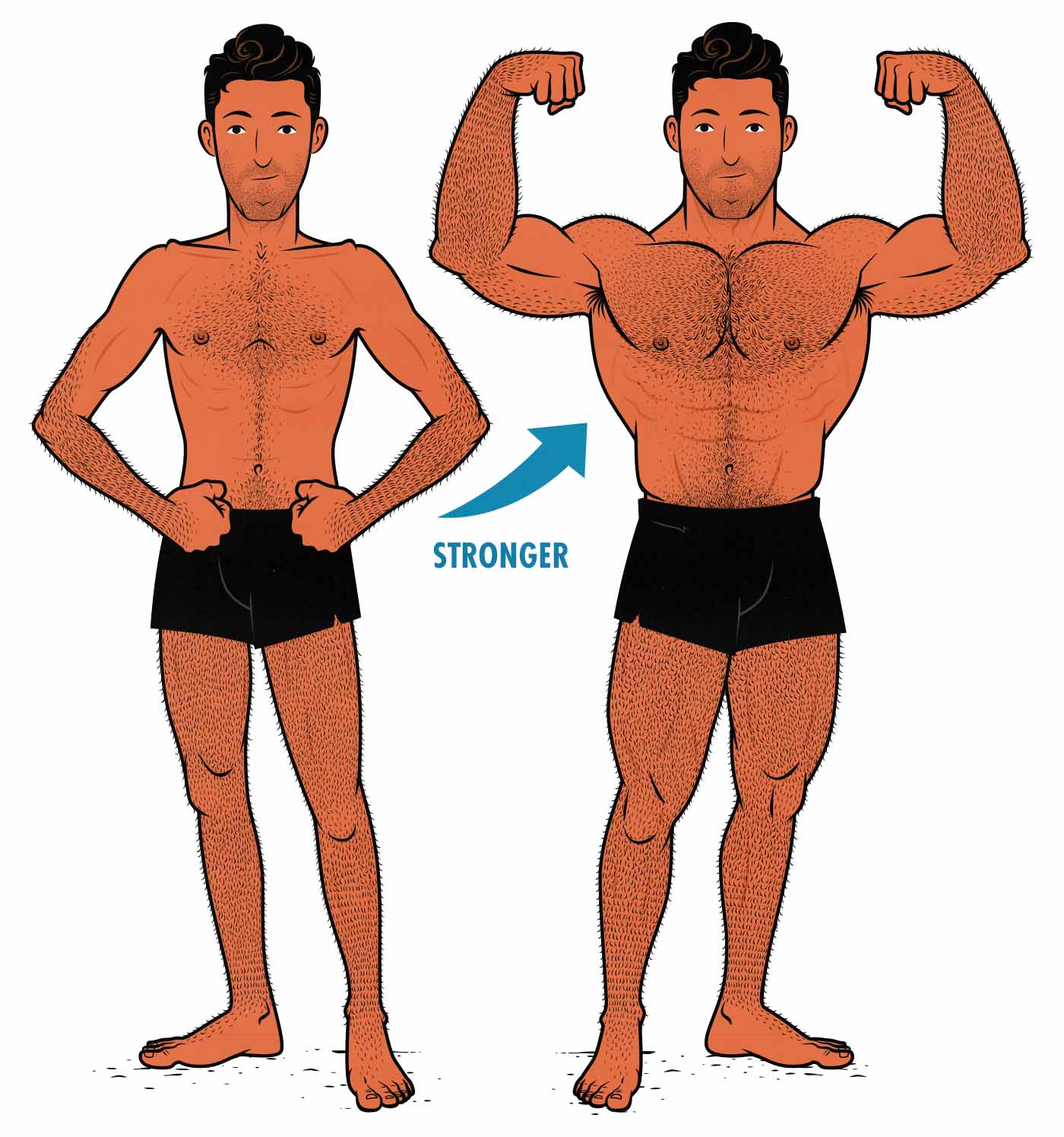
Does Bulking Make You Stronger?
Bulking is the best way to get stronger, especially if you’re thin or lean. If you’re skinny fat or overweight, you can burn that extra fat for energy, allowing you to build muscle without needing to bulk. That’s called recomping. Even then, you’ll eventually run out of extra fat, at which point you’ll need to bulk to continue getting stronger.
Bulking makes you stronger in two different ways:
- Bulking supports muscle growth. Bigger muscles have more horsepower, giving them a greater potential for strength. But building muscle is a costly process. A pound of muscle takes about 800 calories to build, and if you’re a naturally thin guy (like me), it might take closer to 2,800 to overcome your hellish metabolism. That’s why bulking is so helpful.
- Bulking improves performance. Eating more food gives you more energy and pumps your muscles full of glycogen, giving them fuel, improving your workout performance, and increasing your rate of muscle growth. Energy is powerful.
If you finish bulking and switch to cutting, that change in calorie intake can reduce your strength, even if you don’t lose any muscle. For example, it’s common to gain a tremendous amount of bench press strength while you’re bulking, then lose some of it while cutting afterwards.
But there’s a strange myth that building bigger muscles won’t make you stronger. That sounds crazy, but there are some top researchers citing real studies (like this one). Most recently, during an interview with Dr. Peter Attia, the blood flow restriction researcher Dr. Jeremy Leonneke said he’s skeptical that building bigger muscles increases strength.
Let’s delve into it.

Bulking Improves Powerlifting Strength
The idea that building bigger muscles won’t make you stronger comes from a very specific way of defining strength. Powerlifters define strength as how much weight you can lift for 1 repetition on the squat, bench press, and deadlift. The best way to gain that very specific type of strength is to bulk up the relevant muscles while practicing those movements for sets of 1–5 repetitions.
Let’s go over a couple of examples.
Let’s imagine a powerlifter who’s skinny and strong. He probably has good strength genetics: his body shape gives him good leverage, and his muscles attach further from his joints. He’s also probably quite skilled at the exercises he’s doing. Muscle size is still a factor, though, so he’d be even stronger if he bulked up.
Now, let’s imagine a bodybuilder who uses exercise machines. If he never trains his spinal erectors, then they won’t grow bigger or stronger, and he won’t have enough postural strength to squat or deadlift much weight. Thus, in a very narrow way, you could say that bulking up didn’t make him stronger.
But the problem is that this bodybuilder didn’t bulk up enough. If he’d bulked up his spinal erectors, and if he’d practiced the squat and deadlift, then he’d be able to lift much heavier weights than the version of himself who didn’t bulk up.

We know this because a bigger muscle has more contractile tissue, allowing it to produce more force (study). It’s no surprise, then, that the best way to improve your powerlifting performance is to bulk up your muscles as big as you can get them (study).
If you’re curious about how big you can build your muscles, we have a calculator for that. The closer you can get to those numbers, the stronger you’ll be overall.
Bulking Can Harm Calisthenics Strength
There are a couple of exceptions, though. Bulking makes your body heavier, making it harder to do chin-ups, pull-ups, dips, push-ups, muscle-ups, and most other bodyweight exercises. The gains in muscle size more than make up for your heavier body, but only when you’re bulking up the relevant muscles.
For example, bulking up your back and biceps with chin-ups will make you better at doing chin-ups, even though those muscles are heavy. But building bigger leg muscles won’t help with chin-ups, so the heavier those muscles get, the fewer you’ll be able to do. That’s why gymnasts have proportionally bigger upper bodies.
So, if you’re interested in callisthenics, you might not want to overly bulk up the muscles you don’t need (like the ones in your legs). It also pays to keep lean, so I’d recommend doing a lean bulk.
Bulking is Great for General Strength
If you define getting stronger as being able to produce more force, lift heavier things, and carry heavier things for longer, then bulking will absolutely make you stronger. If you’re going to measure your strength with a specific skill (like the bench press), then it helps to train that skill.

If you want help gaining muscle and strength, we have a free newsletter. If you want a muscle-building program for naturally skinny guys, including a 5-month full-body workout routine, gain-easy diet guide, recipe book, and online coaching, check out our Bony to Beastly Bulking Program. We also have a program for skinny women.
Shane Duquette is the founder of Outlift, Bony to Beastly, and Bony to Bombshell, each with millions of readers. He's a Certified Conditioning Coach (CCC), has gained 70 pounds, and has over a decade of experience helping more than 15,000 people build muscle. He also has a degree in fine arts, but those are inversely correlated with muscle growth.

Muscle-Building Mini-Course via EMAIL
Sign up for our 5-part muscle-building mini-course that covers everything you need to know about:
Here are some related articles